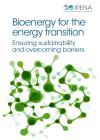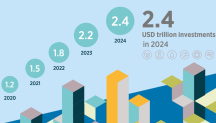

Bioenergy for the Transition: Ensuring Sustainability and Overcoming Barriers
Newsletter
Bioenergy currently accounts for two-thirds of all renewable energy consumption worldwide, including renewable electricity and renewables for heating, cooling and transport. Half of this consumption is in the form of traditional cooking and heating, mostly in developing countries. While these uses are often inefficient or unsustainable, 2.4 billion people worldwide lack access to cleaner alternatives for cooking. Modern applications of bioenergy can provide for electricity generation, heating in buildings, transport fuels or industrial uses. They can also play a major role in the energy transition, especially in sectors with limited renewable alternatives.
Whilst bioenergy offers various benefits, it can also incur negative environmental, social and economic impacts such as biodiversity loss, food insecurity and deforestation. Minimising these potential adverse impacts requires a strong policy framework tailored to local contexts. Policy measures are also urgently required to overcome the various political, financial, technical and supply chain-related barriers that continue to impede bioenergy deployment.
This IRENA report provides an overview of the challenges and related policy measures required to scale up the deployment of key bioenergy applications. It assesses potential sustainability aspects and highlights the significance of a policy framework that includes sustainability-based target setting and long-term planning; cross-sector co-ordination for bioenergy; sustainability governance supported by regulations and certification schemes; as well as integration of bioenergy policy making with the Sustainable Development Goals (SDGs). The report also provides policy recommendations for overcoming barriers to bioenergy deployment for clean cooking, heating in buildings, electricity production, and both industrial and transport applications.




